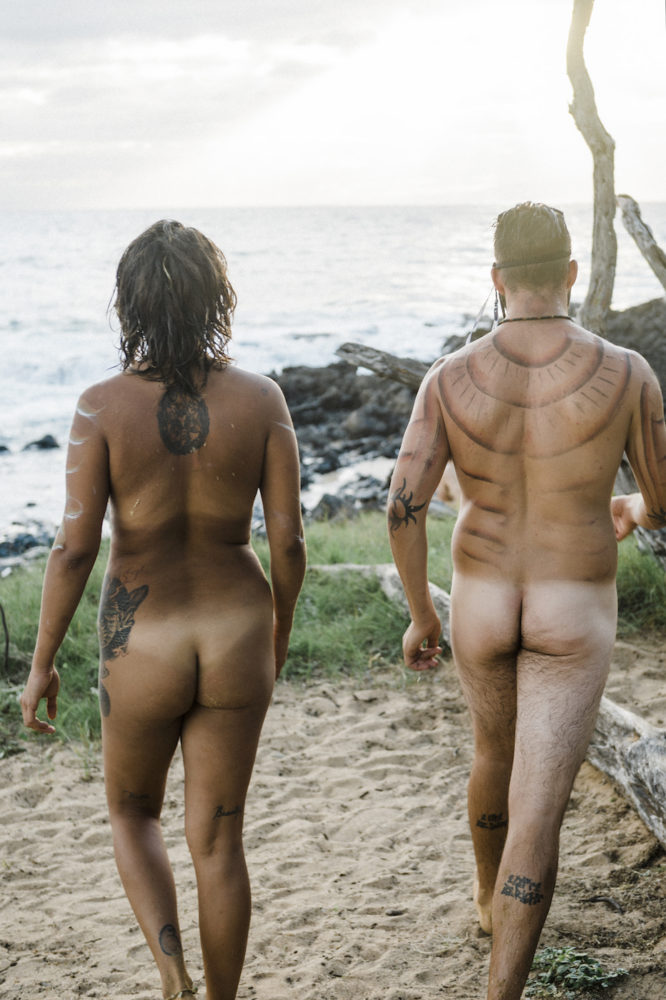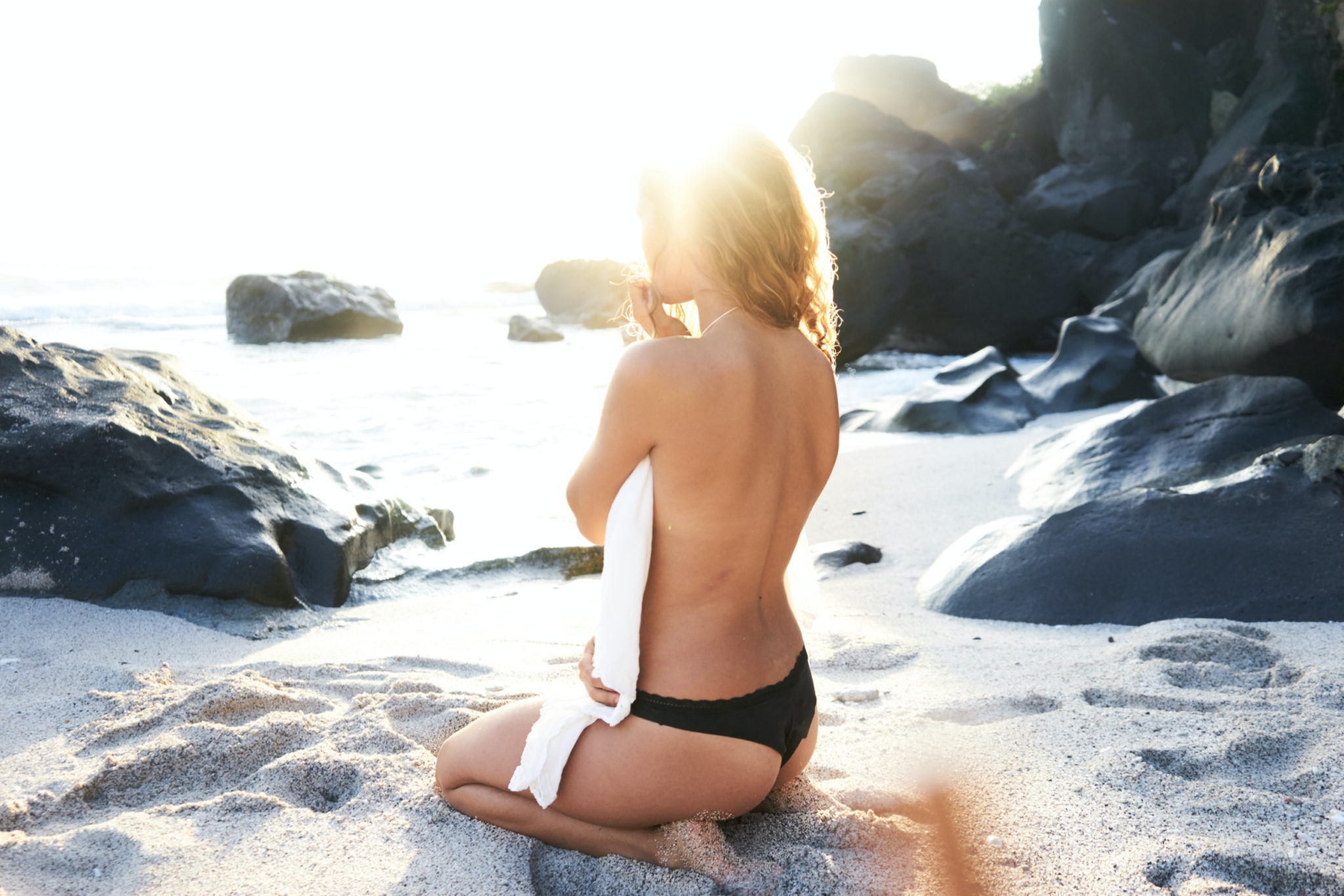On Maui’s south shore, beachgoers revel in a community where conservative mores are needed as much as clothes are: not at all. Welcome to Little Beach.
Text by Rae Sojot
Photos by John Hook and Yoann Boyer
Heading north beyond an outcropping of lava on Maui’s Mākena Beach, intrepid beachgoers follow a well-trodden path to a craggy, windswept bluff. Below, in a secluded cove, a halcyon scene unfolds: Throngs of people cavort in the glittering haze of late afternoon.
Out in the water, bodysurfers glide onto incoming swells, while on the sand, people sing and dance, mingle and lounge. A drum circle studded with a tambourinist and a couple of loose-limbed men wielding maracas supplies a heady tempo to a crowd eager to groove.
READ ALSO: Take a Hike on Maui Through Cloud Forest
Nearby, a bearded gentleman armed with an assortment of paints applies deft strokes of color to a woman’s shoulders. Onlookers murmur in delight as her body transforms into a living, curving canvas.
Further away, a pair of 20-somethings hula-hoop at the water’s edge, their peals of laughter infectious.
Oh, one small detail: Many of these people are nude. Welcome to Little Beach.
Baring it all on Hawaii’s beaches is mildly controversial. Titillating fodder for debate, it beckons, baffles, or bothers, depending on who you ask.
However, the cultural and historical irony of the issue is not lost on Richard Spacer, the president of Kauai Naturists, a social and political action group that supports a clothing-optional lifestyle.
For nearly a millennium, Hawaiians donned little in terms of apparel: Women wore pāʻū (skirts) and men wore malo (loincloths) crafted from ti leaf or kapa, pounded bark cloth. If not wearing kapa kīhei (shawls or capes), both genders went about bare-chested.
But with the first influx of Christian missionaries in the 1820s came Puritan mores. As Western influence rose in the Hawaiian Islands, conservative standards of dress and decorum also increased.
“It was an invasive religion,” Spacer sighs, lamenting that nearly 200 years later, traces of Puritan mentality remain woven into Hawai‘i state laws.
Little Beach is somewhere you can be yourself.

Clothing Optional Rules
Today, Spacer helps those who are curious understand the intersection between Hawaiʻi’s obscenity laws and nudity on its beaches.
He makes key distinctions: Going topless is not nudity regardless of gender, nor is it prohibited in the Hawai‘i Revised Statutes, since its indecent exposure law refers only to genitals.
However, total nudity is prone to a web of jurisdictional complications arising from sometimes discordant federal, state, and city and county regulations.
Fortunately, a guiding principle has emerged.
In 2000, the Hawaiʻi State Supreme Court reviewed a suit involving six men who had been arrested and convicted for being nude on Polo Beach, a popular au naturel destination on Oʻahu’s North Shore.
In the watershed case, the court examined the idea of intention—that is, whether one’s nudity is intended to cause affront— as requisite evidence for an indecent exposure charge.
Determining the men had not intended to offend anyone, the court unanimously reversed the convictions, helping to define Hawaiʻi’s legal parameters for nudity at beaches.
Naturists took the court’s decision as a win, and often cite the case, specifically its summary by Hawai‘i Supreme Court Justice Mario Ramil, as a keystone against people who try to use the law against them.
In the nearly 20 years since the decision, Spacer has witnessed an upward trend in the acceptance and perhaps even embrace of nude recreation.
“Clothing-optional experiences represent a rapidly growing segment of the leisure and travel industry,” Spacer says.
Visit Little Beach
If Hawaiʻi Tourism Authority ever needs a poster beach for a niche naturist market, Little Beach has excellent credentials. For decades, it has led a quiet existence as a nude-friendly, paradisiacal enclave for kamaʻāina, tourists, and transplants alike.
Its sequestered location is ideal: Out of sight and out of mind, it grants peace and privacy from the prying eyes of busybodies and naysayers.
Over time, a vibrant community has flourished, with membership requiring nothing more than an open mind.
Though weekdays remain sedate at Little Beach, Sundays have evolved into glorious affairs. Musicians, artists, fire spinners, and dancers converge upon the shore to perform.
The resulting energy is at once hypnotic and electric; the crowd revels in its euphoria. Whether one is there to participate in the festivities or simply observe, all are welcome.
Most in attendance wear little to nothing, except for the handful of Hawai‘i Department of Land and Natural Resource officers who have begun showing up to curtail incriminatory alcohol consumption. (Open containers of alcohol are illegal on Hawaiʻi beaches.)
Gamely sweating in blue polyester uniforms and work boots, they monitor the carefree crowd from the sidelines like chaperones at a high school dance.
Despite the steady parade of skin and the intermittent whiff of weed carried aloft on the sea breeze, they maintain impressive poker faces.
Naked and Poised
Like most Little Beach frequenters, Hāʻiku gardener Morriah Essence, 22, is unperturbed by their presence. Naked and poised at the water’s edge, with sea foam swirling around her and the setting sun gilding her body gold, Essence is a Botticelli painting incarnate, and she is too blissed out to be bothered by any authoritative entity.
“Little Beach is somewhere you can be yourself,” Essence says.
Her first Little Beach experience—with its energy, diversity, and pulsating drums—left her rapturous and eager to return week after week.
“So much love circulates here. Little Beach is kind of like church on the beach … that consists of medicine for the soul.”
She spots her friend Zac Yurasha in the crowd. Yurasha, 25, who is originally from Massachusetts, is stark naked save for a pair of sunglasses and a thin leather band tied across his forehead.
He is also elated, having just been painted. As he shows off the art on his brawny body, he echoes Essence’s sentiments with exuberance. For Yurasha, going naked on a beach was the stuff of movies, a wildly unattainable experience.
In fact, he had never been on a plane before moving to Maui in the fall of 2017. “But then here I was on Little Beach with everyone, letting loose and being free spirited,” he says.
Yurasha confesses that it took a couple of tries before he felt comfortable enough to go totally nude. But in the process, he realized he wasn’t just shedding clothes—he was shedding his own ego.
“I learned real fast that the less you care, the less others care,” Yurasha says. “The problem nowadays is not others judging you, but you judging yourself.” He flashes a sly grin. “You should try it!”
The spirited duo disappears into the crowd.
I learned real fast that the less you care, the less others care.

Meet the Erringtons
As the mass of beachgoers swells and cascades to the beat of the drums, an unexpected sight is momentarily revealed: Amid the cheery chaos, a boy stands serenely on the sand, clad in an ankle-length sarong.
Later, I learn he is Gabriel Errington. Only 14 years old, Gabriel is a Little Beach regular, and sometimes even performs with fire at its gatherings. He’s been coming to the beach with his father, Jason Errington, the bearded painter, and his mother, Sabrina, since he was 7.
The Erringtons, originally from Florida, have called Maui home since 2010. The move initially produced some culture shock—the change in latitude was indeed a change in attitude. That change, however, was welcomed.
“I come from a very red state,” Jason says. “Florida is racist, bigoted, and intolerant in many areas. It’s repugnant to watch in action. … This was one of our great motivators for fleeing that state. We refused to raise our child in a place with that type of thinking.”
Maui soon proved to be the trio’s version of Eden. While Jason and Sabrina hadn’t sought out Little Beach, a serendipitous visit to its shore dispelled any consternation or preconceptions they may have had.
As parents, they are aware that their decision to expose their son to Little Beach’s liberal landscape raises eyebrows. To them, however, the value in Little Beach’s sense of community and its lessons in humanity surpass any criticism they receive.
Nudity is a great equalizer, Jason explains, of the many walks of life—old, young, affluent, disadvantaged, resident, foreigner—that are present at Little Beach.
“Nudity certainly makes it harder to tell what kind of life you lead, but I think that is good,” Jason says. “It is only after speaking with people do you get to learn what they are all about.”
More Than Skin Deep
Little Beach’s draw is more than skin-deep, its fans insist. It’s a space where inclusivity reigns. It’s a place to be free, and not just of clothes.
“If you want a place where you won’t be judged or excluded, that is Little Beach,” Jason says. “If you want to meet people in single servings or build lasting friendships, this is the place for you. If you want to see that people can coexist peacefully and lovingly, this is your test subject. It is harmony in action. Love rules Littles. This is the beach that aloha built.”

Which is why, each Sunday, the Erringtons, along with hundreds of other Little Beach enthusiasts, gather.
For Gabriel, these experiences have informed his outlook on his life, even at his relatively young age: “It is easy to be happy when you surround yourself
with happiness,” Gabriel says. “Which in turn has taught me the kind of people I should surround myself with.”
By this point, most of the drum circle’s musicians have stolen away for a swim or a chat or a smoke. A single drummer remains, providing a joyous, rhythmic throb—the eternal heartbeat of Little Beach.

